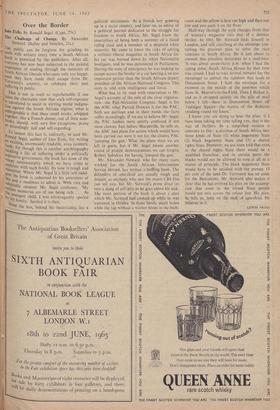Over the Border
Into Exile, By Ronald Segal. (Cape, 25s.) The Challenge of Change. By Alexander Steward. (Bailey and Swinfen, 21s.) so exceedingly dull and self-regarding.
To lament this fact is, indirectly, to laud Mr. zconald Segal, author of Into Exile, for writing abri xciting, enormously readable, even eccentric re°K; for though this is another autobiography ,,ecalling a life of suffering under a politically :!Pressive government, the book has none of the 7ePY sentimentality which we have come to sso , 'ciate with such books Its tone is tough and Illasculine. Where Mr. Segal is a little self-indul- rat the book is redeemed by his awareness of ,14,1s and a readiness to admit it. With rare and ZIrable candour Mr. Segal confesses: 'My thrilesl memories are of our being rich. . . . As
of
by Mingest child, I was extravagantly spoiled EllY family.' Spoiled it is then. ,I\one the less, behind his theatricality lies a s.....-.."-,,-- THE Public can be forgiven for grinding its 1 teeth with anxiety every time a South African book is promised by the publishers. After all, everyone has now been subjected to the painful experience of reading through the memoirs of South 'African liberals who seem only too happy, 1,Once they have made their escape from Dr. v erwoerd's country, to celebrate their past suffering in public.
That is not in itself so reprehensible if one Sakes the charitable view that such self-exposure is calculated to assist in stirring world indigna- tic'h against the South African regime; what is Oforgivable is that these small books, whipped together, like a French dinner, out of little note-
ooks, should, with very few exceptions, prove political seriousness. As a Jewish boy growing up in a racist country, and later on, as editor of a political journal dedicated to the struggle for freedom in South Africa, Mr. Segal knew the insecurities of being both a member of a hated ruling class and a member of a despised white minority. He came to know the risks of editing a militant liberal magazine in South Africa for his car was burned down by white Nationalist hooligans, and he was denounced in Parliament. During the state of emergency he was making an escape across the border in a car bearing a no less important person than the South African deputy president of the African National Congress. This story is told with intelligence and force.
What -has to be read with reservation is Mr. Segal's account of the role of the rival organisa- tion—the Pan-Africanist Congress. Segal is for the ANC what Patrick Duncan is for the PAC: both are partisan and in their hands the facts suffer accordingly. If we are to believe Mr. Segal, the PAC leaders were utterly confused if not mere clowns. Just before Sharpeville, he tells us, the ANC had plans for action which would have been carried out were it not for the clumsy PAC 'jumping the gun.' What the plans were we are left to guess, but if Mr. Segal means another round of protest demonstrations we can forgive Robert Sobukwe for having 'jumped the gun.'
Mr. Alexander Steward who for many years worked for the South African Information Service abroad, has written a baffling book. The defenders of apartheid are usually tough and brazen, as anybody who saw the recent CBS film can tell you, but Mr. Steward's prose disso'ves into a dung of self-pity as he goes about his task. The main portion of the book is about a plan which Mr. Steward had cooked up while he was stationed in Ottawa 'in those lonely small hours
while the tap without a washer hisses in the bath- room and the pillow is first too high and then too low and you push it on the floor.'
Half-way through the style changes from that of woman's magazine into that of a definite thriller. In 1961 Mr. Steward finds himself in London, and still clutching at the envelope con- taining his precious plan to solve the race relations in South Africa. He is just about to commit this priceless document to a mail-box: 'It was about seven-thirty p.m. when I had the typing done. South Africa House by that time was closed. I had to wait several minutes for the messenger to unlock the sidedoor that leads to Duncannon Street. I held the envelope for a moment in the mouth of the post-box which faces St. Martin's-in-the-Field. Then I flicked it, and as it dropped quietly on the pile of mail below I felt—there in Duncannon Street off Trafalgar Square—the waters of the Rubicon swishing round my knees.'
I know you are dying to hear the plan; if I have been taking my time telling you, that is the way of thrillers. In a simplified version it amounts to this: a division of South Africa into three kinds of State (1) white hegemony State (2) black hegemony State and (3) a shared rights State. However, we are soon told that even in the shared rights State there would be a qualified franchise, and in certain parts the blacks would not be allowed to vote at all as a matter of principle. The black hegemony State would have to be satisfied with the present 13 per cent of the land Dr. Verwoerd has set aside for the Bantustans. Mr. Steward also makes it clear that he has evolved his plan on the assump- tion that even in the mixed State people would not mix across the colour line. His plan, he tells us, rests on the rock of apartheid. He believes in it.
LEWIS NKOSI


































 Previous page
Previous page